An estimated 178 million Americans are missing at least one tooth, and about 40 million are missing all their teeth. Luckily, there are plenty of options to choose from to replace your missing teeth, including dentures in Sparta. These restorations are custom-made to meet each and every patient’s smile needs. They are designed to be a natural and comfortable part of your smile, and they have been proven to be sturdy enough to last for several years. If you’re missing all or most of your teeth, give us a call to schedule your consultation for dentures.
Dentures – Sparta, NJ
We Can Help Bring Back Your Smile

Why Choose Gentle Dentistry Sparta for Dentures?
- Treatment Designed to Look and Feel Natural
- Dentist Trained at the Prestigious Pankey Institute
- Custom-Made Restorations for Every Patient
What Are Dentures?
There are two kinds of dentures: full and partial. When you hear the word “dentures,” what you probably think of are full dentures. These are sets of artificial teeth attached to a gum-colored acrylic or plastic base that replace an entire arch of pearly whites. They are ideal for patients missing all of their teeth on either the top or bottom row of their mouth.
Partial dentures, sometimes just called partials, are made for patients only missing some of their teeth. They consist of some false teeth on an arch wire with clasps that attach to remaining natural teeth and blend right in with the rest of your smile.
Who’s a Good Candidate for Dentures?

It doesn’t matter if you’re missing one tooth, several teeth, or an entire arch – almost everyone is eligible for dentures! The prosthetic teeth are versatile and custom-made to fit your smile perfectly. Of course, the only way to know for sure whether you’re a good candidate or not is by scheduling a consultation with our team at Gentle Dentistry Sparta. During your appointment, we’ll conduct an oral examination to find out if this option is right for you. Even if you’re not a good candidate, we may be able to help by restoring the health of your jawbone structure and gum line.
Effects of Missing Teeth

First things first, it’s important to understand why you have missing teeth. According to the American College of Prosthodontists, the most common causes of tooth loss involve gum disease, tooth decay, and physical injury. Having infected or inflamed gums can lead to damage to the connective tissue that holds your teeth in place. In some cases, a tooth that is damaged beyond repair may require an extraction to preserve your oral health.
No matter what happens, you must take every step possible to replace missing teeth. Otherwise, the jawbone can begin to shrink due to a lack of stimulation of blood flow. Failing to address the issue may cause the bone tissue to weaken, increasing the risk of further tooth loss. Without a strong jawbone, you might begin to experience complications like facial sagging, difficulty eating, trouble speaking, and lower self-confidence.
What Qualifies You for Dentures?
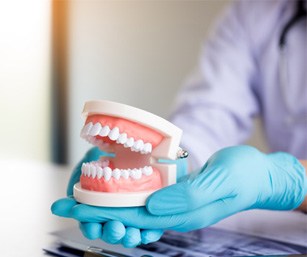
Truthfully, most people who suffer from extensive tooth loss may be eligible to receive dentures. While the materials and techniques used to craft these prosthetics have changed over the years, their ability to complete a smile remains the same.
Rest assured – even patients who initially don’t qualify for dentures can potentially get them after undergoing certain preliminary procedures. For example, a bone graft might be necessary to strengthen your jawbone. During your consultation, we’ll determine which type of denture is right for you and work the appropriate treatments into your plan to get your oral health up to speed.
Alternative Tooth-Replacement Options
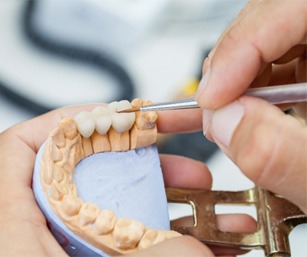
If dentures aren’t a viable option for you, our team may be able to provide you with alternative methods of tooth replacement. Some of those include:
- Dental Bridges – Patients that are only missing one or several teeth in a row may want to consider dental bridges. The only requirement is to have nearby healthy teeth on either side of the gap to support the bridge.
- Dental Implants Using titanium posts surgically inserted into the jawbone, we can create a strong foundation to support your new teeth. Dental implants require a durable facial structure and sufficient bone density. Although this option comes with a higher upfront cost, you can expect to enjoy your results for a lifetime.
Learn More About Dental Bridges Learn More About Dental Implants
Benefits of Dentures

If you’re missing teeth in Sparta, getting dentures can provide a whole host of benefits. When you have gaps in your grin, you have likely adapted by learning to smile and laugh with your mouth closed. But this way, you’re not enjoying yourself to the fullest. Dentures allow you to not worry about how your smile looks, because you can trust that it looks amazing. Here are some of the benefits that you can expect when you choose dentures to restore your smile.
Psychological Benefits

People who don’t have any teeth may have difficulty accepting tooth loss. This can have a negative impact on your self-esteem and therefore your social life. This comes with a higher risk of experiencing sadness and depression. By restoring the appearance and function of your smile with dentures, patients are likely to experience increased confidence and self-esteem. Dentures can reduce anxieties about your appearance, speech articulation, chewing ability, and more!
Clearer Enunciation

Missing teeth can make it more difficult for you to speak clearly. In order to pronounce and perform words, your lips and tongue need to be positioned properly. When you can’t touch your tongue to your teeth, some words become very difficult to say clearly. Dentures act as your missing teeth, therefore allowing you to enunciate more clearly while speaking. After just a short adjustment period, you will be talking just like you used to!
Improves Nutrition

Many healthy foods are tough in texture, including certain vegetables, fruits, and proteins. When you are unable to chew your food, you can experience problems like indigestion and malnutrition. By allowing you to chew thoroughly again, you can enjoy an expansive diet full of nutritious foods. Ultimately, dentures can help your body receive essential nutrients needed for optimal overall health.
Preserves Oral Health

If you have some healthy natural teeth, getting dentures can help to prevent them from shifting to other areas of the mouth. Dentures can bear some of the weight of regular chewing, therefore reducing the wear and tear of existing teeth.
Expands Opportunity

Your smile is the first thing people see, and a great first impression is crucial when it comes to interviews, sales, and getting promotions. A beautiful smile is definitely an advantage to you in the professional world.
How Dentures Are Made
Did you recently take the plunge on getting dentures in Sparta? If so, you may now be wondering what the process looks like, especially since they’re custom-made based on your unique smile. By understanding how they’re made and knowing which materials will be used, you can appreciate your grin that much more. Want to learn more? Simply keep reading below!
What Are Dentures Made Of?
First and foremost, you should know the basic components that make up a denture. The two main parts are:
- Denture Base: Known as the foundational structure, this component gives the artificial teeth support. It can be made from several different materials, including acrylic, nylon, or resin. Full dentures are typically made using acrylic since the material can more easily be matched to your natural gum tissue. Meanwhile, partial dentures use metal clips with an acrylic base.
- Artificial Teeth: This is often made from resin or porcelain as they both have a natural-looking appearance. Of course, porcelain is the more popular option because it looks and feels very similar to natural teeth.
The Denture Creation Process
No two smiles are the same. As such, each denture is custom-made to fit your mouth perfectly. Here’s a step-by-step of what the process typically looks like:
- Step 1: Impressions will be taken of your upper and lower gums using a thick paste. This is used to create a plaster model that is the exact size and shape of your mouth, ensuring the final denture fits you correctly.
- Step 2: The cast is sent to a trusted dental laboratory for the creation of your final dentures. There, they will create a wax version of the gum line.
- Step 3: Your prosthetic teeth are set in place and a mechanical device known as an articulator will be used to attach the teeth to the wax. If needed, the technician will make minor adjustments.
- Step 4: The wax dentures are sent back to the dental office for a fitting. Once they’re approved by you and your dentist, they’ll be sent back to the lab to complete the process.
- Step 5: At the lab, a technician will boil the dentures to eliminate the wax portions. The dentures are placed in a flask, and plaster is poured to maintain the shape of the dentures. The entire flask is then poured into hot water to melt the dentures.
- Step 6: Next, holes are made in the teeth and acrylic is injected into the flask to replace the wax.
- Step 7: The plaster is carefully removed using special lab tools to reveal the denture. Then, the acrylic dentures are placed in an ultrasonic bath to remove any remaining plaster.
- Step 8: Excess acrylic will be cut from the denture and after trimming, the denture will be polished to perfection.
- Step 9: Once your dentures are ready, you’ll return to the office for a fitting. Final adjustments are made to ensure everything is working properly and correctly!
Adjusting to Your New Dentures
It’s incredibly normal to feel mild discomfort when you first get your new dentures. Luckily, this is temporary and will go away once you get used to your prosthetic. Before you know it, your dentures will feel very similar to natural teeth! During the adjustment period, it’s a good idea to follow a soft-food diet and exercise your facial muscles. Should your discomfort persist, don’t hesitate to give us a call for assistance.
Implant-Retained Dentures

You may have heard that as the shape of your jawbone changes over time due to tooth loss, so does the fit of your dentures. This may cause your false teeth to slip around when you’re speaking or eating, which can be embarrassing. Fortunately, there is a way to prevent this from happening, with dentures held in place by dental implants. We can place an average of four to six implants throughout your jawbone to hold a full or partial denture in place. The great thing about dental implants is that they retain the shape of your jawbone, preserving your facial muscles and keeping your dentures from losing their fit over the years. If you take proper care of your implant-retained dentures, you can expect them to last for decades to come.
Understanding the Cost of Dentures

Dentures are highly customized and can be used to replace just about any number of teeth. As a result, it’s difficult to pinpoint an exact cost until you’ve completed a dedicated consultation at our office. No matter how much you need to pay for your future tooth replacement, we’ll ensure that you’re satisfied with your prosthetic to the fullest extent!
Factors that Affect the Cost of Dentures

Multiple steps go into creating a denture, each of which have their own costs attached. This includes the preparation and the materials used to make it look natural and last for many years of use. For example:
- Preparatory treatments like tooth extractions may be needed before dentures can be placed. This not only increases total costs, but extends the length of the treatment process.
- The type of acrylic used to create the base of the denture can also vary in quality. Some acrylics are both more durable and easier to custom-shade to your existing gum tissue.
- The replacement teeth can also be made from acrylic to cut costs, but often times dentists will use porcelain for better esthetics.
- Keep in mind that cheaper is not necessarily better, especially for something you’ll be using every day!
Are Implant Dentures More Expensive?

Implant dentures are generally more costly, but there’s a good reason for it. For example, implant dentures rely on about four to eight dental implants to keep the restoration in place. These not only ensure better stability, but work to replace the roots of teeth entirely. That means they are longer-lasting, more durable, and feel far more natural than traditional dentures. It’s largely considered a long-term investment because you should not need to replace them nearly as often (if at all) compared to traditional dentures, which generally has to be done every five to seven years.
Does Dental Insurance Cover Dentures?

Dentures are a major procedure according to most dental insurance plans, which means they are covered by benefits in most cases. The coverage percentage tends to hover around 50%, but this can vary depending on your plan. Our team will be happy to help you confirm your specific benefits in advance so you are not caught off guard by surprise costs.
Other Options for Making Dentures Affordable

Even if you don’t have dental insurance, there are still ways you can make your denture costs more affordable. Many patients take advantage of CareCredit, a third-party financing option that allows for monthly payments on more expensive dental services, including tooth replacements like dentures. Many of their payment plans even allow for little to zero interest! Alternatively, our in-house membership plan provides discounts on major services like dentures. Those who are interested in dental implants to hold dentures can receive an evaluation from our dentists entirely free of charge!
To learn more, please give Gentle Dentistry Sparta a call today to schedule a consultation!
Dentures Aftercare

Your dentures can completely revitalize the appearance and functionality of your smile—but it falls on you to maintain your restoration and keep it as sanitary and intact as possible. This involves cleaning your dentures as frequently as needed, but also ensuring that they’re being housed in a hygienic environment. You’ll also want to be sure that you’re handling your restoration with care and protecting it when it’s not being worn. Keep reading below to learn more about a few critical aspects of denture care so that you can ensure your smile looks and feels its absolute best for several years to come!
Removeable Dentures
Remove After Eating
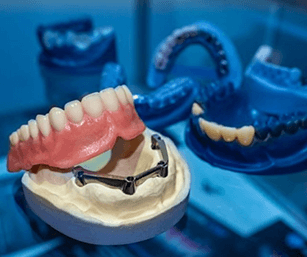
One of the biggest advantages of wearing dentures is that they grant you the ability to eat most foods with ease. But no matter what you’re eating, it’s important that you remove your dentures afterward in order to rinse them off and clean them. Although they aren’t your natural teeth, dentures are still susceptible to plaque and tartar buildup—which is an issue that can and will negatively affect your oral health! Be sure you aren’t rinsing your dentures with hot water though, as this can warp them.
Clean Your Restoration

If your dentures are removable, you’ll need to take them out of your mouth often to clean them. You can do this using a soft-bristled toothbrush and a small amount of unscented hand soap or dish soap, though denture cleanser is your best bet. Don’t use regular toothpaste, as your dentures aren’t designed to handle those types of abrasive products. If you don’t plan on immediately wearing your dentures after cleaning them, you can place them in a container of water or cleaning solution to prevent them from drying out or losing their shape. And always rinse your dentures before returning them to your mouth.
Keep Your Dentures Safe
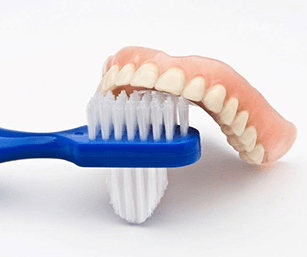
Your dentures are an important new addition to your mouth—so you should take several preventive measures to ensure their safety and integrity! Whenever you remove your dentures for cleaning, there’s always the possibility of you dropping and breaking them, so it’s useful to place a towel underneath them to cushion any potential fall damage. Also be sure that when you aren’t wearing or cleaning your dentures, they’re stored in a safe place away from any pets or young children.
Remove When You Sleep
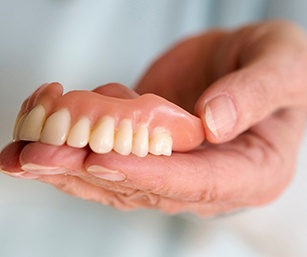
Removable dentures need to be taken out at night when you go to bed; wearing them during the night can restrict circulation to your gums, causing soft-tissue irritation. Research also shows that sleeping with dentures is associated with a higher risk of pneumonia, as well as higher levels of gum and tongue plaque. It’s best to keep your dentures in a denture-soaking solution overnight to keep them as sanitary and moist as possible.
Notice Changes
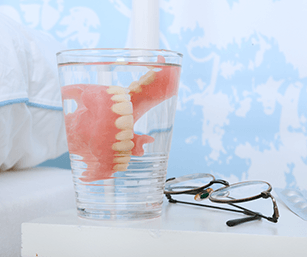
You should remain vigilant and keep an eye out for any changes that affect your dentures and let us know if something seems off. This includes mouth sores, gum irritation, signs of infection, shifting and clicking noises, and even damage to the dentures themselves. If your dentures sustain damage or seem ill-fitting, do not try to repair them yourself; let us know so that we can quickly address the issue and get your smile back in working order!
All-on-4 Dentures
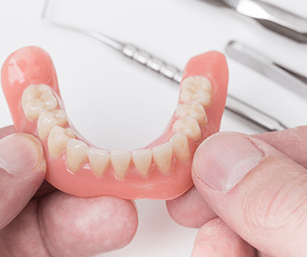
If you have All-on-4 dentures, you’ll want to approach things slightly differently and keep the following in mind:
- Brush twice a day using a soft-bristled manual or electric toothbrush and a non-abrasive toothpaste; avoid types of toothpaste that contain baking soda or stain-removing agents.
- Floss your replacement teeth daily; you might consider floss threaders to help you access beneath your denture. A water flosser might also be a useful investment for keeping your restoration clean.
- Also consider using sulcus brushes; these are roughly 1/3 the width of a normal brush and are well-suited for cleaning between the restoration and the gums.
- Use an antibacterial mouthwash daily to prevent the growth of plaque and tartar.
Denture FAQs

If you’re suffering from moderate to severe tooth loss, we can help bring back your smile with a reliable, custom-made full or partial denture. This classic tooth loss solution is a great way to quickly and easily replace your missing teeth and get back to enjoying a complete smile. For your convenience, we’ve gathered some common denture FAQs in Sparta below so you can learn more about them. If you don’t see the answers you’re looking for, don’t hesitate to give us a call and we’ll be happy to help!
Do dentures have to be kept in water?
Thanks to modern dental technology, dentures are precisely crafted to form a close, secure, and comfortable fit. If they dry out however, they may warp and lose their shape, making them uncomfortable and ill-fitting. Whenever your dentures are not in your mouth, you should keep them in a glass of water to ensure they keep their shape. This also helps keep all the small nooks and crannies clean and free of bacteria. You can either store them in plain water or use a specialized denture soaking solution.
How many hours a day should I wear my dentures?
You probably don’t want to be caught without your new teeth, but it’s important to remove your dentures from time to time in order to give your gums a rest. We generally recommend that you wear dentures all day and night after you first get them to help your mouth adjust. Then, after about a week, you should take them out every night, brush them off, and soak them overnight. Not only does this help keep plaque and bacteria from building up on your new teeth, but it will help prevent gum irritation.
Will wearing dentures irritate my gums?
Properly fitting, custom-made dentures won’t cause any gum irritation. Even so, it’s important to remember that your mouth will naturally begin to change shape over time as a result of your tooth loss. This will cause your dentures to gradually lose their close fit over the course of several years. After about seven to ten years of use, you should have your dentures readjusted or replaced to ensure your new smile stays comfortable and your gums remain healthy.
How long do dentures last?
As mentioned above, the average lifespan of a set of removable dentures is between seven and ten years. They could last even longer with the proper care, so make sure to clean your dentures regularly, handle them carefully, and visit us twice a year for routine checkups.
Implant dentures, on the other hand, last much longer. Since the implant posts that hold this type of denture in place fuse directly with your jawbone, they should never lose their grip. In fact, they stimulate blood flow in the jawbone to prevent the changes in your mouth that naturally come with tooth loss. With great oral hygiene, you can easily expect your implant-retained dentures to last a lifetime!
How long will I need to wait to get dentures after an extraction?
If you’re receiving dentures after a tooth extraction, the typical healing period is between six and eight weeks. However, this largely depends on the type of denture you’ll be receiving. If it has a soft lining that acts as a pressure bandage between the prosthetic and gums, you may be able to wear them sooner. In any case, you’ll need to give your gums the opportunity to heal so you’ll be comfortable wearing them.
What is the average age for dentures?
There’s a misconception that dentures are only for older adults, but the truth is, tooth loss doesn’t discriminate based on age. It can occur due to chronic oral health concerns, like gum disease, other medical conditions and treatments you’re undergoing, and accidents, all of which can happen whether you’re in your 20s or 80s.
The National Center for Health Statistics estimates that around 66% of people between 40 and 64 are missing at least one tooth, compared to 33% between 20 and 39. So, going off of these statistics, you’re more likely to need full or partial dentures over the age of 40.Is it hard to talk with dentures?
Everyone who gets dentures undergoes an adjustment period that lasts around a month. During this time, you’ll be building up the muscles that support your dentures, helping you speak and eat better. However, when you first get your prosthetic, it will likely be difficult to complete these basic daily tasks without your replacement teeth slipping or shifting. Once you get over the adjustment hump, you should be able to eat and speak with ease. Just keep in mind that practice and patience is key!
What foods are hard to eat with dentures?
We recommend steering clear of sticky, hard, and tough foods with your dentures. Or, if you do eat these, be sure to consume them in very small amounts so they don’t dislodge your prosthetic. Some examples of foods that we encourage being mindful while eating include:
- Nuts
- Popcorn
- Tough meats like steak and pork chops
- Crunchy, fresh vegetables like carrots
- Corn on the cob
- Shelled nuts
- Sesame seeds
- Peanut butter
- Gummy candies or caramels
